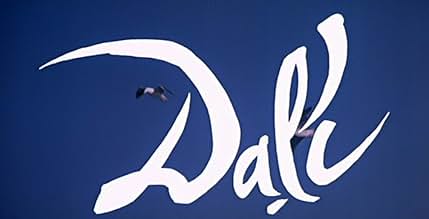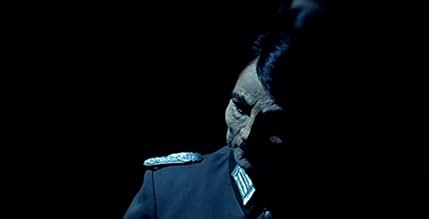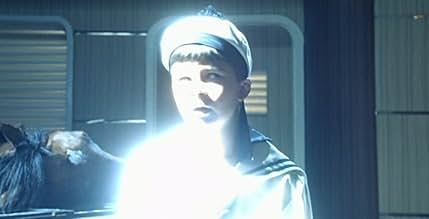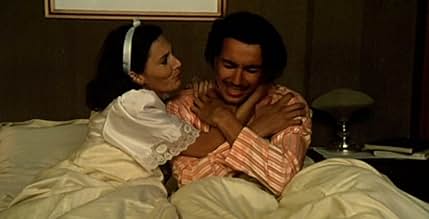Biografía del afamado artista Salvador Dali, centrada principalmente en su relación con su novia Gala y el tiempo que pasaron en la ciudad de Nueva York en 1940 y sus primeros días en España... Leer todoBiografía del afamado artista Salvador Dali, centrada principalmente en su relación con su novia Gala y el tiempo que pasaron en la ciudad de Nueva York en 1940 y sus primeros días en España colaborando con el cineasta Luis Bunuel.Biografía del afamado artista Salvador Dali, centrada principalmente en su relación con su novia Gala y el tiempo que pasaron en la ciudad de Nueva York en 1940 y sus primeros días en España colaborando con el cineasta Luis Bunuel.
Max Freeman
- Journalist
- (as Momchil Karamitev)
Valentín Fernández-Tubau
- Journalist
- (as Valentín Tubau)
Argumento
Reseña destacada
This is a rather obscure film in the USA, and the only way I was able to see it was via a Japanese laserdisc. When buying this rare disc, I discovered that there was almost no information in English, and very little in other languages, on the 'net about this film, this site included, so I thought I'd post some.
Not to be confused with a 1986 documentary film of the same name directed by Adam Low, this is a biographical film on the Spanish surrealist painter Salvador Dali. Young Dali, already famous in Europe, arrives in New York in the 1940s because that's where the money is, and the war isn't. He and his companion Gala begin meeting with an American reporter for interviews, and in the process tell the story of Dali's life and early career. The ensuing flashbacks portray some famous artists that he met, worked with, and had conflicts with, for example Pablo Picasso, Garcia-Lorca, Luis Bunuel, or Jean Cocteau. The premier of Dali and Bunuel's groundbreaking 1929 surrealist film `Un chien andalou' is briefly depicted, showing snippets of the actual film and the audience's mixture of amazement and disgust at it. There is some recreation of surreal imagery from Dali's work, in the form of dream sequences or the distorted imaginings of Dali's fertile mind. The famous image of the `limp watches' from one of his best-known paintings appears as a sculpture in an imagined scene of Spanish Civil War refugees, the watches actually hanging from the trees and flapping in the wind. More sculpturally-rendered images from his paintings are in this scene as well. Other surrealist touches include some very odd costumes, and a scary, bizarre dream sequence at the start of the film. There is a fair amount of nudity in this film, none of which I would consider gratuitous, but consistent with the bohemian lifestyles and surreal visions that are its subject. All this makes `Dali' great fun to watch. It ends abruptly with Dali deciding to return to Europe.
Lorenzo Quinn (Anthony Quinn's son), gives a very likable portrayal of Dali as a young man, nicely capturing the combination of artistic vision, aggressive ambition, flamboyant charisma, and pure B.S. that Dali is known for. When meeting with strangers, reporters, or people whose chains he just wanted to yank, Dali adopted an odd, distorted way of speaking that was barely intelligible, and Quinn reproduces this very well. If I hadn't seen film of the real Dali speaking this way, I would have suspected it was a fanciful invention of the filmmakers. Quinn shows great charisma in this role, and is totally believable as young Salvador Dali.
I do find this film a bit shallow in its portrayal of some of the famous artists of Dali's time. It doesn't attempt to actually SHOW Dali and Bunuel making `Un chien andalou,' and people like Bunuel and Cocteau are not fleshed-out in any way. For example, all it tells us about Bunuel is that he liked to look at women's asses -- very enlightening. In addition, the music seems a bit chintzy, not really helping with the mood of the piece, and evoking a cheap, made-for-TV-movie impression. The very abrupt ending, with the credits and more of that chintzy music running over a freeze-frame, only adds to that impression. I think the inadequacy of the music score annoyed me the most.
Nevertheless, the surreal imagery is a lot of fun, and Quinn's charismatic portrayal of Dali, makes it well worth seeing, if you can find it.
Not to be confused with a 1986 documentary film of the same name directed by Adam Low, this is a biographical film on the Spanish surrealist painter Salvador Dali. Young Dali, already famous in Europe, arrives in New York in the 1940s because that's where the money is, and the war isn't. He and his companion Gala begin meeting with an American reporter for interviews, and in the process tell the story of Dali's life and early career. The ensuing flashbacks portray some famous artists that he met, worked with, and had conflicts with, for example Pablo Picasso, Garcia-Lorca, Luis Bunuel, or Jean Cocteau. The premier of Dali and Bunuel's groundbreaking 1929 surrealist film `Un chien andalou' is briefly depicted, showing snippets of the actual film and the audience's mixture of amazement and disgust at it. There is some recreation of surreal imagery from Dali's work, in the form of dream sequences or the distorted imaginings of Dali's fertile mind. The famous image of the `limp watches' from one of his best-known paintings appears as a sculpture in an imagined scene of Spanish Civil War refugees, the watches actually hanging from the trees and flapping in the wind. More sculpturally-rendered images from his paintings are in this scene as well. Other surrealist touches include some very odd costumes, and a scary, bizarre dream sequence at the start of the film. There is a fair amount of nudity in this film, none of which I would consider gratuitous, but consistent with the bohemian lifestyles and surreal visions that are its subject. All this makes `Dali' great fun to watch. It ends abruptly with Dali deciding to return to Europe.
Lorenzo Quinn (Anthony Quinn's son), gives a very likable portrayal of Dali as a young man, nicely capturing the combination of artistic vision, aggressive ambition, flamboyant charisma, and pure B.S. that Dali is known for. When meeting with strangers, reporters, or people whose chains he just wanted to yank, Dali adopted an odd, distorted way of speaking that was barely intelligible, and Quinn reproduces this very well. If I hadn't seen film of the real Dali speaking this way, I would have suspected it was a fanciful invention of the filmmakers. Quinn shows great charisma in this role, and is totally believable as young Salvador Dali.
I do find this film a bit shallow in its portrayal of some of the famous artists of Dali's time. It doesn't attempt to actually SHOW Dali and Bunuel making `Un chien andalou,' and people like Bunuel and Cocteau are not fleshed-out in any way. For example, all it tells us about Bunuel is that he liked to look at women's asses -- very enlightening. In addition, the music seems a bit chintzy, not really helping with the mood of the piece, and evoking a cheap, made-for-TV-movie impression. The very abrupt ending, with the credits and more of that chintzy music running over a freeze-frame, only adds to that impression. I think the inadequacy of the music score annoyed me the most.
Nevertheless, the surreal imagery is a lot of fun, and Quinn's charismatic portrayal of Dali, makes it well worth seeing, if you can find it.
- Bobs-9
- 21 may 2001
- Enlace permanente
Selecciones populares
Inicia sesión para calificar y añadir a tu lista para recibir recomendaciones personalizadas
- How long is Dalí?Con tecnología de Alexa
Detalles
- Duración1 hora 46 minutos
- Color
- Mezcla de sonido
Contribuir a esta página
Sugerir un cambio o añadir el contenido que falta

Principal laguna de datos
By what name was Dalí (1991) officially released in Canada in English?
Responde





















